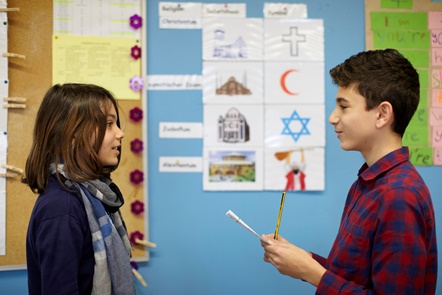Puberty: When children grow up
Parents talk about their experiences
The previously beloved toys are banished from the children’s rooms, friends suddenly become more important than their own parents and the conversations at the dinner table become more heated.
What it is like when your own children reach puberty
Luna (16) & Lilith (11)
"I noticed that from the fact that I was less interested in doing things. I argued more with my parents and siblings and my interests have changed."
"The others have warned me that I am now in puberty, my sister Luna and also my mom."
How did you notice that you were in puberty?
The body changes
Puberty usually begins with a growth spurt. In girls, the breast begins to grow and they get their first menstruation. In boys, beard growth begins, their voice becomes deeper and the first ejaculation occurs.
In both boys and girls, hair begins to grow under the armpits and in the pubic area.
New structures are formed in the brain that ensure that hormones are released. In both sexes, both the female hormone estrogen and the male hormone testosterone are released.
The physique of boys and girls is also changing. The girls’ pelvis widens and they gain weight. The boys’ bodies become more athletic and their cross a little wider.
Paul Gerhard Mackert, pediatrician
"When puberty begins is genetically determined. In girls, she starts around nine years old, in boys around two years later."
When does puberty begin??
Puberty at school
Teachers also have to deal with their pupils during puberty come. A challenge for the class.
Patrick Brauweiler, Heliosschule Cologne
"Our many years of experience help us deal with children and adolescents during puberty. There is no magic formula for good teaching. However, it is significantly different than in the upper level."
How to teach pubescent students
Puberty in the classroom?
Sex education is firmly anchored in the NRW curriculum. How exactly the teaching units are organized, however, is very different. Many teachers get support for this, for example from sex counselors at the counseling center "Pro Familia", by gay-lesbian organizations or specialists such as gynecologists and urologists.
The topic of sexuality is often shameful, many students have to learn to talk about it, also that it is completely okay to have questions about it.
It often helps if students are allowed to write down their questions anonymously, which are then answered collectively.
What it’s like to talk about puberty in class
It is important to educate children at an early age and explain to them exactly which changes in puberty they will face. If this doesn’t happen at home, the school has to help. It is also a special situation for the students to talk about sexuality and adulthood at school.
Children have to become independent
"The time of puberty is a very important time of development and maturation. There are naturally many upheavals and upheavals here. It is the job of children and adolescents to detach themselves from their own identity search", says Anja Antoine, psychologist and head of the Caritas advice center in Cologne-Porz.
"The external developments in puberty are very obvious, but the internal psychological developments, which are often expressed in the behavior of adolescents, and this behavior can be problematic. Sometimes the behavior shows itself in extreme withdrawal and passivity. But it can also be the exact opposite that adolescents try to act and break out a lot, including aggressive behavior."
How can I support my child in puberty?
How can I support my child in puberty?

- Clarify early: The sooner and more precisely the children know which changes in puberty they will face, the better they can classify the first period or the first ejaculation.
- Authority person remain: Above all, parents should provide a stable framework. Show a clear stance on your own moral and value system.
- Search the conversation: Even though parents are often rejected by their children, it is important to keep talking, to be curious, and to show interest in their children.
- Exchange ideas: All parents have to go through puberty with their children. Talking about the challenges and problems can help to better classify the situation at home. In many places there are special group offers for parents.
RELATED ITEMS
-

Although there is so much information, we “no longer see the forest for the trees”. We look outside what is already in all of us:…
-

Strong parents – strong children® – puberty, German child protection association
Caution: remodeling work in the brain! Sometimes parents do not recognize their pubescent children – the physical and mental strengths are so strong…
-

When children grow up – costs in the last phase of children
Children cost money. Up to the age of 18 of their offspring, German parents spent around 130,000 euros on them according to the Federal Statistical Office….
-

Cooperation between kindergarten and primary school
Orientation area (jump marks) The education portal: School system School system Basics School types Elementary school Language level assessment Transition…
